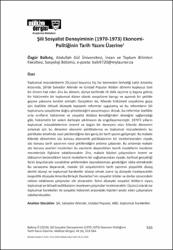| dc.contributor.author | Balkılıç, Özgür | |
| dc.date.accessioned | 2023-12-08T14:02:18Z | |
| dc.date.available | 2023-12-08T14:02:18Z | |
| dc.date.issued | 2018 | en_US |
| dc.identifier.issn | 1305-9971 | |
| dc.identifier.uri | https://hdl.handle.net/20.500.12573/1857 | |
| dc.description.abstract | Toplumsal mücadelelerin 20.yüzyıl boyunca hiç hız kesmeden ilerlediği Latin Amerikakıtasında, Şili’de Salvador Allende ve Unidad Popular iktidarı dönemi kuşkusuz özelbir önemi hak eder. Zira bu dönem, dünya tarihinde ilk defa seçimle iş başına gelmişbir hükümetin bir toplumsal düzen olarak sosyalizme barışçı ve aşamalı bir şekildegeçme çabasına tanıklık etmiştir. Gerçekten de, Allende hükümeti sosyalizme geçişiçin özellikle iktisadi düzeyde kapsamlı reformlar uygulamış ve bu reformların Şilitoplumunu sosyalizme doğru yönelteceğini savunmuştur. Ancak, bu reformlar özellikleorta sınıfların hükümete ve sosyalist iktidara kendiliğinden desteğini sağlamadığıgibi, hükümetin bir askeri darbeyle yıkılmasını da engelleyememiştir. 1970’li yıllarıntoplumsal mücadelelerinin önemli ve özgün bir deneyimi olan Allende döneminianlamak için bu dönemin ekonomi politikalarına ve toplumsal mücadelelerin bupolitikalar etrafında nasıl şekillendiğine dair geniş bir tarih yazımı gelişmiştir. Bu makaleAllende döneminin söz konusu ekonomik politikalarının bir incelemesinden ziyade,söz konusu tarih yazınının nasıl şekillendiğini anlama çabasıdır. Bu anlamda makalesöz konusu eserleri incelerken bu eserlerin dayandıkları teorik modellerin incelemenesneleriyle ilişkisine odaklanacaktır. Zira, makale böylesi çalışmaların önemi veiddiasının beslendikleri teorik modellerin bir sağlamasından ziyade, tarihsel gerçekliğifarklı boyutlarıyla sunabilme yetilerinden kaynaklanması gerektiğini iddia etmektedir.Bu varsayıma dayanarak, makale Şili sosyalizminin tarih yazımını jeopolitik düzey,devlet düzeyi ve toplumsal hareketler düzeyi olmak üzere üç düzeyde inceleyecektir.Jeopolitik düzeyde Amerika Birleşik Devletleri’nin sosyalist iktidar ve darbe sürecindekirolüne odaklanan çalışmalar ele alınacaktır. İkinci düzeyde sosyalist iktidarın siyasi,toplumsal ve iktisadi politikalarını inceleyen çalışmalar incelenecektir. Üçüncü olarak isetoplumsal hareketler ile sosyalist hükümet arasındaki ilişkileri analiz eden çalışmalaraodaklanılacaktır. | en_US |
| dc.description.abstract | In the history of Latin America which has been characterized by intense political and social struggles, the coalition government of Unidad Popular led by Salvador Allende in Chile (1970-1973) deserves a careful analysis. Spesifically, this period witnessed the first socialist government which claimed power through an election and announced that it would gradually transform the political power and society in a peaceful way. In fact, the Allende government imposed extensive economic reforms and assumed that such reforms and their successes would ipso facto be enough to gain the support of majority of people for the regime. However, these reforms neither recieved support from the middle-classes towards the government nor did they consolidate the power of the government. Eventually, as it is well known, the socialist government was overthrown by a group within the Chilean army. Afterwards, an extensive history literature - which focused on how the Allende government has implemented its economic policies and how the social struggles are shaped in relation to such policies - has emerged in an attempt to explain the period of Allende government. This article is, however, not an analysis of those economic, social and political developments; but, rather, it is an attempt to understand how the historical literature itself has progressed. While critically analyzing the literature, it will, therefore, ask whether the literature discussed in this article is concerned only with validiating their theoretical tenets or whether they are really interested to explain the complex economic, political and social relations of the period. Therefore, this article assumes that such works derive their importance and success from their ability to present historical processes with their various dimensions rather than their attempts to certify their theoretical “assumptions”. By drawing upon such an approch, I will criticize the historiography on three levels including geopolitical, state and grassroots social movement levels. At the first level, the article will focus on the studies which mainly analyze the USA’s role on the Chilean socialist power and the coup d’etat in 1973. For the second level, it will look at the researches which deal with the political and economic policies of the socialist government. And at the third level, the article will analyze the literature whose focal points are the relations between the socialist government and grassroots social movements. | en_US |
| dc.language.iso | tur | en_US |
| dc.publisher | Mülkiyeliler Birliği Genel Merkezi | en_US |
| dc.rights | info:eu-repo/semantics/openAccess | en_US |
| dc.subject | Şili | en_US |
| dc.subject | Salvador Allende | en_US |
| dc.subject | Unidad Popular | en_US |
| dc.subject | ABD | en_US |
| dc.subject | toplumsal hareketler | en_US |
| dc.subject | Chile | en_US |
| dc.subject | the grasroots movements | en_US |
| dc.title | Şili Sosyalist Deneyiminin (1970-1973) Ekonomi- Politiğinin Tarih Yazını Üzerine | en_US |
| dc.title.alternative | On the Historiography of the Political Economy of the Socialist Period (1970-73) in Chile | en_US |
| dc.type | article | en_US |
| dc.contributor.department | AGÜ | en_US |
| dc.contributor.authorID | 0000-0001-6929-2548 | en_US |
| dc.contributor.institutionauthor | Balkılıç, Özgür | |
| dc.identifier.volume | 42 | en_US |
| dc.identifier.issue | 4 | en_US |
| dc.identifier.startpage | 533 | en_US |
| dc.identifier.endpage | 564 | en_US |
| dc.relation.journal | Mülkiye Dergisi | en_US |
| dc.relation.publicationcategory | Makale - Ulusal Hakemli Dergi - Kurum Öğretim Elemanı | en_US |


















